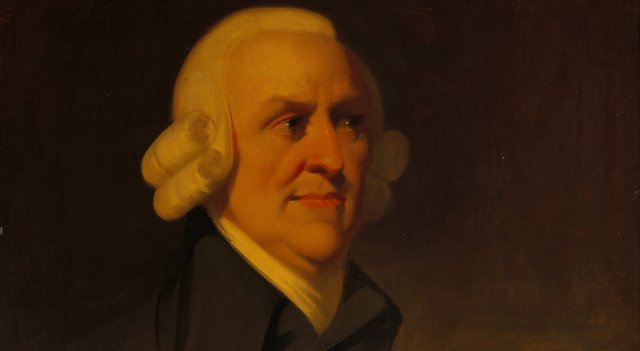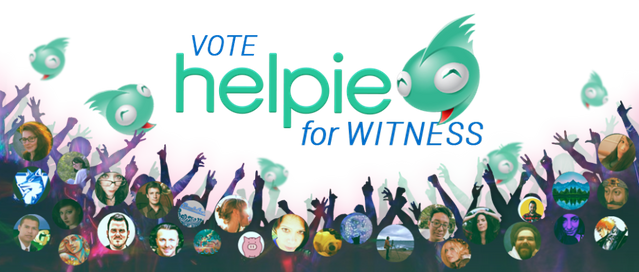Invisible Invisible Hand
Ideas matter, beliefs matter, they have consequences, as they inform actions. It's no secret that there have been many, many bad ideas in our collective histories, that have had bad, bad consequences; Stalinism was a bad idea, slavery was a bad idea, and the idea that some group of people is less than human, like we experienced in the Second World War, might be the worst idea ever conceived, with the worst real world results.

Adam Smith - source: Wikimedia Commons
Rummaging through a seemingly bottomless pit filled with humanity's bad ideas (don't worry, the pit with good ideas is equally limitless), some of the worst of them soon come floating to the surface. Prominent among those is the misinterpretation of Adam Smith's "invisible hand" that has become so popular in libertarian circles as a justification for self interest and greed as moral goods. Laissez faire market proponents use this argument from the "father" of free enterprise as a foundation for the belief in the self-organizing quality of a system, consisting of free, profit seeking rational agents, and a price-discovery mechanism that would magically produce a just equilibrium on the point where supply meets demand, in which almost everyone lucky enough to participate would get what they deserve.
This belief in the beneficial aspects of the free flow of goods and services, driven only by individual self interest, is so deeply rooted that it's greatest proponents can actually come away with statements like "greed, for lack of a better word, is good, greed is right, greed works, greed clarifies, cuts through and captures the essence," like in the original Wall Street by Oliver Stone, or "The Social Responsibility of Business Is to Increase Its Profits," as stated by Milton Friedman in New York Times Magazine in 1970. Greed as a social responsibility is a silly, no, dangerous idea, resulting in the perpetual "tragedy of the commons" we've been expanding on and "perfecting" over the lion's share of our 12,000 year cultural evolution.
Wall Street (4/5) Movie CLIP - Greed Is Good (1987)
This whole train of thought starts with John Locke's night-watchman's state, which is explained as farmers "naturally" banding together to protect their property; the minimalist government in the libertarian's mind exists only to protect private property, to provide a police force and a military. The singular focus on the "liberation of the individual from any type of coercion" in these minds results in the blind embracing of the false interpretation of Adam Smith's Invisible Hand by the likes of Hayek and Friedman, or any idea that supports the kind of "personal freedom" that they envision, or so it seems at least.
In business ethics, accordingly, Adam Smith typically proves to be a stumbling block rather than a resource. He is all too often taken to have successfully defended, once and for all, greed and self-interest, the "magic of the market" and the irrelevance of morals in business. His latter-day celebrants, notably Milton Friedman and his Chicago-school Brethren, typically glorify what they take to be the underlying message of the Wealth of Nations without much troubling themselves about the philosophical and ethical framework within which that great book was conceived and written, indeed, without paying much attention at all to the deep ethical tensions within the book itself.
source: JSTOR
Adam Smith knew that the result of the free market could be a concentration of wealth in the hands of the few that own the means of production. Furthermore, he knew that these forces should be kept in check by ALL governments if this was the case. This will surprise a lot of people. Like so many ideas, Smith's is Hayek'ed to serve the needs of the owner-class. In short, Smith's book argues that the invisible hand represents the unseen instincts of human nature that motivate and direct behavior. Channeled through appropriate human institutions, the invisible hand can generate a spontaneous and beneficial social order. "Unseen instincts," not ONLY self interest. And more importantly: "channeled through appropriate human institutions." Smith was anything but in favor of laissez faire capitalism as propagandized by Hayek and Friedman's Chicago school of economics. I don't even think he ever used the word "capitalism" in the Wealth of Nations, which was written in the late 1700s.
The invisible hand of Adam Smith was grounded in the "human instincts" that prevailed in his time's paradigm, a time when thinking was still ruled by Christian faith, with important roles for selflessness, altruism, sympathy and the commons. Smith's ideas are a far cry from the Milton Friedmanized caricature of an invisible hand expressed in the "spontaneous order" emerging from greed-driven market mechanisms. Smith did not regard self interest as an unqualified good, but recognized it as an unprincipled impulse to be used for good, but also to be held in check and regulated as necessary for the good of society: "Those exertions of the natural liberty of a few individuals, which might endanger the security of the whole society, are, and ought to be, restrained by the laws of all governments." When he wrote this, he specifically had in mind the Fiat money system that he recognized as the result of a few men exercising their "natural liberty" to issue promissory notes to people who, in their "natural liberty" voluntarily accept these notes as a means of exchanging value. That came out crooked.. but you know what I mean.
And besides, we don't really need to fall back on these outdated ideas, do we? We can just open our eyes and look around to see the fallacy of the modern interpretation of greed as a force for good. This modern interpretation fails to distinguish self interest from selfishness, and fails to see the important role for community and the commons in the interest of self interest. Freedom has no meaning if it's not to be enjoyed in the community of people. Everybody can be free on an uninhabited island, in a community the best we can do is maximize freedom, and this can never, ever be the resultant of a system that maximizes the protection of private property, accumulated by maximized greed. This is physically, materially and spiritually impossible. Freedom is found in the realization that we're NOT independent, self-sufficient or self-made, but that everything in this reality depends on everything else. Every man, woman and child depends on other men, women and children in their own time and times gone by, and their actions, resulting from their beliefs, will influence every man, woman and child in the future. Greed, unregulated by a non-existent invisible hand and propagandized in the constant messaging from the guardians of the greed-status quo, shouldn't be our legacy. It can't be, as the tragedy of the commons will prevent that... I hope.
What is the tragedy of the commons? - Nicholas Amendolare
Jean Jacques Rousseau said: "People who know little are usually great talkers, while men who know much say little"... Wait. That's not it. I talk a lot... Hmmmm... I'll close with a short reflection on the quote I did have in mind:
"The first person who, having enclosed a plot of land, took it into his head to say this is mine and found people simple enough to believe him was the true founder of civil society. What crimes, wars, murders, what miseries and horrors would the human race have been spared, had some one pulled up the stakes or filled in the ditch and cried out to his fellow men: 'Do not listen to this imposter. You are lost if you forget that the fruits of the earth belong to all and the earth to no one!'"
Just stop and think for a second about the absurdity of claiming a part of the planet as your own. Think of the implications; what does it really mean to be able to say that a piece of the earth is yours, and yours alone. Think about what's going on in space right now, how corporations are trying to be the first to plant their flag on a piece of alien land. Did you know you can buy land on the Moon and several planets of our solar system? Check it out; I hope you're as disgruntled as I am... The absurdity of claiming a piece of land as your own for the sole reason of arriving there first. Or claiming an idea simply because you had it first. Why do I feel lonely in thinking that this is absurd? Owning land is the basis of all power in the world, ownership in itself comes with power and it "naturally" builds around itself a grid of protection, to protect itself, expressed in laws and governments with police and a military. John Locke's idea of a night-watch state is a self defeating idea, as is the misinterpreted version of Smith's invisible hand.
I'm all for smaller government, much less rules and regulations too; I don't even believe "rules" apply to humans at all, "guidelines" is what they really are. But capitalism just doesn't allow for small government, for as long as it grows, as long as ever more emphasis is given to greed as a force for good, it's counterweight needs to grow with it. Parallel to that, the control grid that exists to regulate public opinion needs to grow too, culminating in a surveillance state in which your every move and transaction is monitored and channeled in such a way as to maximize profits for the owners of said control grid. It's not rocket science. It's just a deeply rooted bad idea with bad consequences, which needs to be kept in check for so long as it remains.
(I realize, dear reader, that I've taken on a rather "matter of fact" tone in this semi-rant... Please keep in mind that however sure I sound of myself, I'm just sharing one of many opinions; there are as many as there are people ;-) And I'm grateful that you take time to take note of it; thanks so much for visiting my blog!)
The Social Contract (Selection) by Jean-Jacques Rousseau
Thanks so much for visiting my blog and reading my posts dear reader, I appreciate that a lot :-) If you like my content, please consider leaving a comment, upvote or resteem. I'll be back here tomorrow and sincerely hope you'll join me. Until then, keep steeming!

Recent articles you might be interested in:
| Latest article >>>>>>>>>>> | Humenemy |
|---|---|
| Balance Of Opposites | Feynman's One Dollar Patent |
| Water Wars | Knowing Versus Understanding |
| Bruce Skywalker..? | Cost Efficiency Vs True Efficiency |

Thanks for stopping by and reading. If you really liked this content, if you disagree (or if you do agree), please leave a comment. Of course, upvotes, follows, resteems are all greatly appreciated, but nothing brings me and you more growth than sharing our ideas. It's what Steemit is made for!


Just for Full Disclosure, I'm invested in these crypto-currencies:
Bitcoin | Litecoin | EOS | OmiseGo | FunFair | KIN | Pillar | DENT | Polymath | XDCE | 0x | Decred | Ethereum | Carmel | XYO

@helpie is a WITNESS now! So please help @helpie help you by voting for us here!

Invisible Hidden Hand!
Good
Thanks! :-)